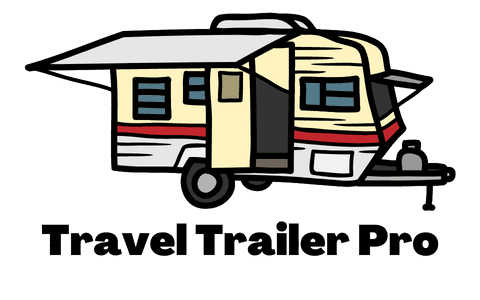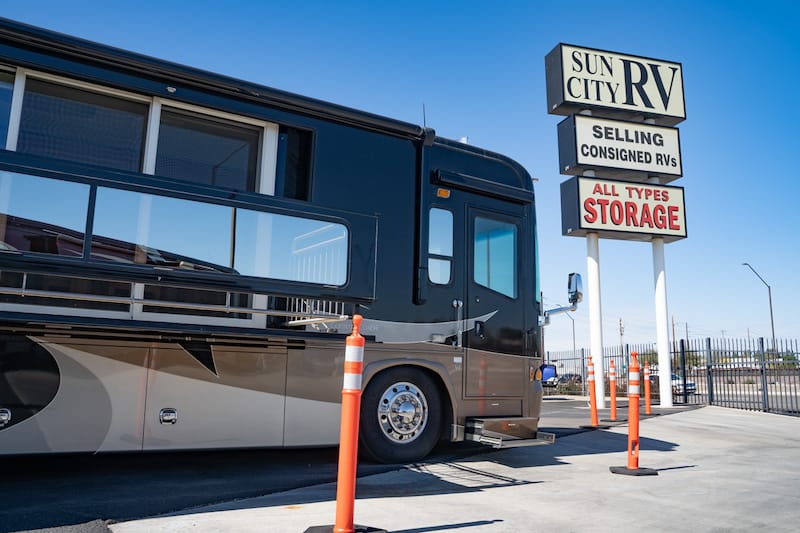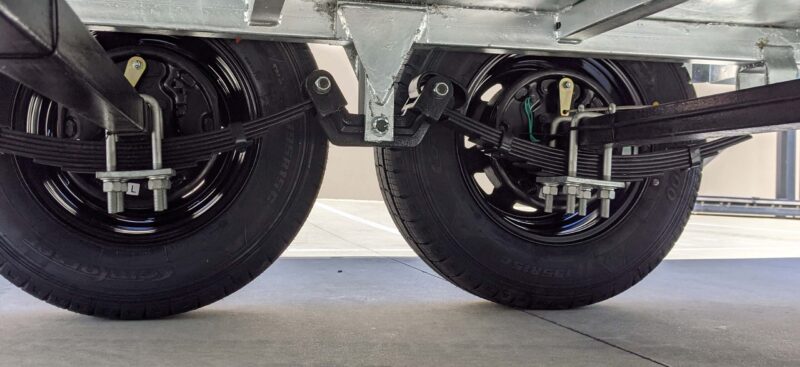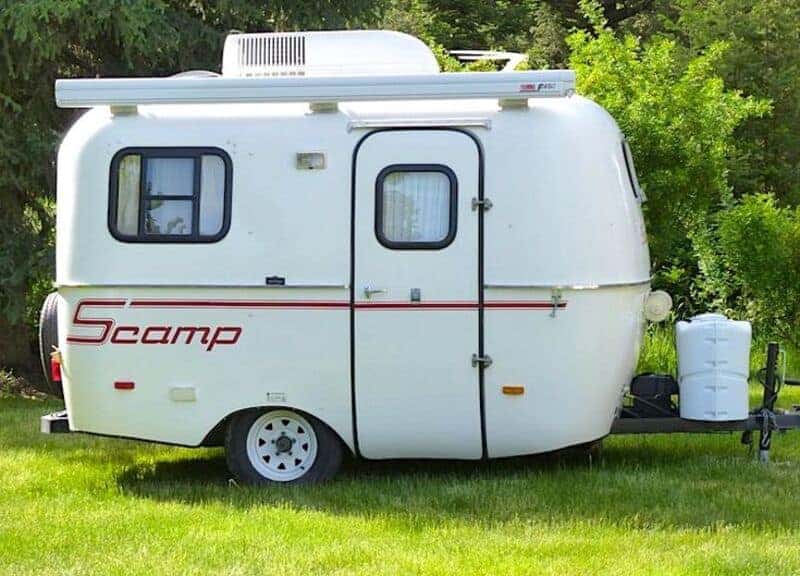Have you ever wondered if there’s a better way to sell your RV than the traditional methods? Perhaps you’re contemplating selling your RV on consignment, but you’re unsure what it entails or whether it’s the right choice.
RV consignment is a third-party selling arrangement, like having an agent for your beloved motor home. This process involves entrusting your RV to a dealer or another reseller who will then take on the responsibility of marketing and selling your RV on your behalf.
It’s a method that offers a potential solution to the hassle and time consumption often associated with selling an RV directly. While the convenience of RV consignment appeals to many, it’s not a decision to be taken lightly.
Similar to other significant financial decisions, it’s crucial to consider both sides.
RV consignment undoubtedly has compelling benefits, from broad market exposure to skilled negotiation handling. However, there may also be downsides, such as possible consignment fees or a potentially longer sales process.
In this comprehensive analysis, we delve deep into the advantages and disadvantages of RV consignment. We aim to provide you with a balanced perspective so you can decide whether this route is the best fit for you and your road-ready companion.
What Is RV Consignment?
RV consignment is a concept that often pops up in the RV world but remains ambiguous to many. What exactly is it, and how does it work?
RV consignment is when you, as an RV owner, decide to sell your RV through a third party, typically an RV dealer or reseller. Much like consignment in the clothing industry, but on a grander scale, this involves handing over your RV to another party to manage the sale while you keep ownership.
The beauty of RV consignment lies in its simplicity and convenience. By choosing this route, you delegate the nitty-gritty of the selling process—from handling phone inquiries and appointments to managing negotiations—to seasoned professionals.
RV consignment is more than just a service; it’s a legal agreement between two parties. But as with any financial decision, RV consignment has pros and cons.
How Does RV Consignment Work?
RV consignment is when an RV owner engages a consignment company to sell their RV on their behalf. The arrangement eases the owner of tedious tasks, such as advertising, showcasing the RV to potential buyers, negotiating the sale, and handling all the paperwork.
The consignment company typically charges a commission fee based on the final sale price of the RV. With this system, RV owners can expand their reach and potentially secure a better selling price for their RV instead of selling it privately.
The consignment company may offer additional services like detailing, repairs, and storage.
The person or entity selling on your behalf is the consignee, and you, the original owner, are the consigner. It’s akin to hiring a real estate agent, but instead of selling a house, they’re selling your RV.
While this arrangement has benefits, weighing them against any potential downsides before deciding is essential.
Is RV Consignment Better Than Selling Private?
In RV sales, owners often find themselves torn between two primary methods: RV consignment and private selling.
Each approach has unique advantages and potential drawbacks, thus making the choice heavily dependent on individual circumstances and preferences.
RV consignment entails engaging a dealer or professional reseller to market and sell your RV on your behalf. It’s an option that offers convenience and relative peace of mind, as it eliminates the need for you to handle advertising, inquiries, and showings.
If you are short on time or need more expertise in RV sales, this option can be beneficial.
RV consignment is a popular choice for higher-priced RVs, as experienced dealers often have a wider reach and better negotiation skills to secure a favorable deal.
Private selling involves direct interaction between you and the buyer. This approach gives you complete control over the selling process, including setting the price and negotiating terms.
While it may require more effort and time than consignment, private selling could yield higher profits, as there are no dealer commissions to pay.
However, it’s important to note neither method guarantees a quick sale or the highest price. The RV market fluctuates depending on various factors, such as seasonality, demand, and the condition and type of your RV.
Therefore, patience and realistic expectations are critical whether you choose RV consignment or private selling. Ultimately, the choice between RV consignment and private selling boils down to your situation, comfort level, and selling objectives.
RV consignment might be the way to go if you prefer a hands-off approach and are okay with sharing a portion of the sale proceeds.
Conversely, private selling could be your best bet if you enjoy the thrill of negotiation and want to maximize your profits.
5 Pros Of RV Consignment
RV consignment can benefit many RV owners looking to sell their vehicles.
Here are some of the key advantages:
1. Stress-Free Selling
One of the most significant benefits of RV consignment is how it takes the burden off your shoulders. Handling the sale of an RV can be intimidating, but with consignment, the dealer handles all the heavy lifting.
You can relax knowing the dealer will take care of all the logistics and intricacies of the selling process, freeing you to focus on what matters most.
2. No Need to Handle Inquiries
With RV consignment, you won’t have to deal with constant phone calls and emails from potential buyers. The dealer will handle all inquiries, saving you time and sparing you from potential stress.
3. Negotiation Assistance
Not everyone is comfortable negotiating prices.
When you consign your RV, the dealer will handle all negotiations on your behalf, ensuring you get the best possible price for your vehicle.
4. Expert Advertising
Dealers have extensive advertising experience and know where to list your RV to attract potential buyers. They’ll list your RV in multiple places, increasing its visibility and enhancing the chances of a quick sale.
5. Access to Potential Buyers
Dealers often have a list of people looking for specific types of RVs. When you consign your RV with a dealer, they can contact these individuals directly, potentially speeding up the sale process.
RV consignment can offer a hassle-free, convenient method of selling your RV, with the added advantage of expert assistance.
5 Cons Of RV Consignment
RV consignment may be a convenient method of selling your RV, but like all sales methods, it comes with disadvantages.
Here are some potential cons of RV consignment:
1. Cost
As with any service, using an RV consignment service will cost you money.
Most consignment dealers charge a commission fee, usually around 10% of your total selling price, which can affect your profits.
2. Limited Access to Your RV
Once your RV is in consignment, you no longer have the freedom to use it as you please. It can be a significant drawback if you plan a sudden trip or require it urgently.
3. Potential for Complicated Sales
If you find a buyer yourself while your RV is on consignment, they will still have to go through the dealer because of the consignment contract.
Such complications may impede the sales process and discourage potential buyers.
4. Insurance Considerations
Regular RV insurance typically isn’t valid while the RV is on consignment.
It is essential to know that you may be required to invest in consignment insurance, which may cause extra expenses.
5. Commitment to Contract Terms
Consigning your RV involves signing a contract with the consignment dealer.
You’ll need to commit to the terms of this contract for its duration, which could limit your flexibility if circumstances change.
What Is The Cost Of RV Consignment?
RV consignment typically involves a fee structure, which can vary based on the consignment company.
There are two main types of contracts:
- Set Dollar Amount: The RV owner agrees with the dealer on a fixed amount they’ll receive from the sale. The dealer keeps any amount above this set price as their commission.
- Percentage of Selling Price: The dealer takes a portion of the total selling price as their commission. It’s common to have this type of agreement, where the percentages usually fall between 10% and 15%.
However, the cost of RV consignment continues beyond these fees. There may be additional charges you need to consider.
These could include:
- Cleaning Fees: The RV might have to be cleaned before it’s presented for sale. Some dealers may charge a fee for this service.
- Lot Fees: The dealer may charge a fee for displaying your RV on their lot. Premium spot fees may also apply if they place your RV in a high-visibility location on the lot.
- Advertisement Fees: Although many dealers include advertising as part of their service, some might charge extra for listing your RV in various places or featuring it in ads.
Given these potential costs, it’s crucial to fully understand the fee structure of the consignment agreement before signing.
Always ask for a detailed breakdown of all charges and read the fine print carefully. Remember, transparency is critical in any consignment deal.
Can I Still Use My RV While It’s On Consignment?
Consignment agreements can differ, so reviewing your specific contract’s terms carefully and clarifying doubts with the dealer before proceeding is essential.
Do I Need Consignment Insurance?
Consignment insurance, or inventory or stock insurance, protects consigned goods from loss or damage in the seller’s possession (consignee). This insurance safeguards both the owner (consignor) and the seller of the goods.
You will face significant financial risk if you don’t have consignment insurance and your consigned product gets lost, stolen, or damaged. Contrarily, RV insurance is specific to recreational vehicles, covering risks associated with their usage.
If consigning an RV, both insurance types are necessary.
When buying consignment insurance, ensure the policy covers all risks and offers adequate compensation. Consider the insurer’s reputation and claim settlement ratio.
Costs vary based on the goods’ value, type, consignment period length, and policy terms. Most commercial insurance providers offer consignment insurance.
Is Now A Good Time To Sell Your RV?
Based on current market trends, used RV sales and prices have been strong due to increased interest in road trips and outdoor vacations. However, the flip side is if you’re considering buying a new RV after selling, high demand could also drive up those prices.
Many factors can influence the future of the RV market, such as fuel prices, travel restrictions, and economic conditions.
While some experts predict the trend of high demand to continue, others expect a potential market saturation.
Final Thoughts About RV Consignment
RV consignment is a convenient and hassle-free method to sell your RV, using the expertise of a dealer to handle the sale process.
However, it’s crucial to weigh the pros and cons, considering the associated costs, commitment to contract terms, and limitations of access to your RV.
Understanding the fee structure of the consignment agreement and the need for consignment insurance are vital factors.
The decision to sell your RV should also consider the current market trends and future predictions.
Remember, total transparency and clarity in terms are essential in any consignment deal. Being informed and cautious can ensure a smooth and beneficial RV consignment experience.
Related Reading:
– 8 Travel Trailers With The Best Resale Value
– How Much Do Dealers Mark Up Travel Trailers?
– Are Travel Trailer Warranties Transferable?
– 10 Best Travel Trailers Under $25,000
About the Author:
Mike Scarpignato is an avid RVer who owns a Class C RV and a Class A RV. He loves to travel with his wife Susan and write blog articles about the RV lifestyle.
Mike and Susan also make YouTube videos on the RVBlogger YouTube channel.




